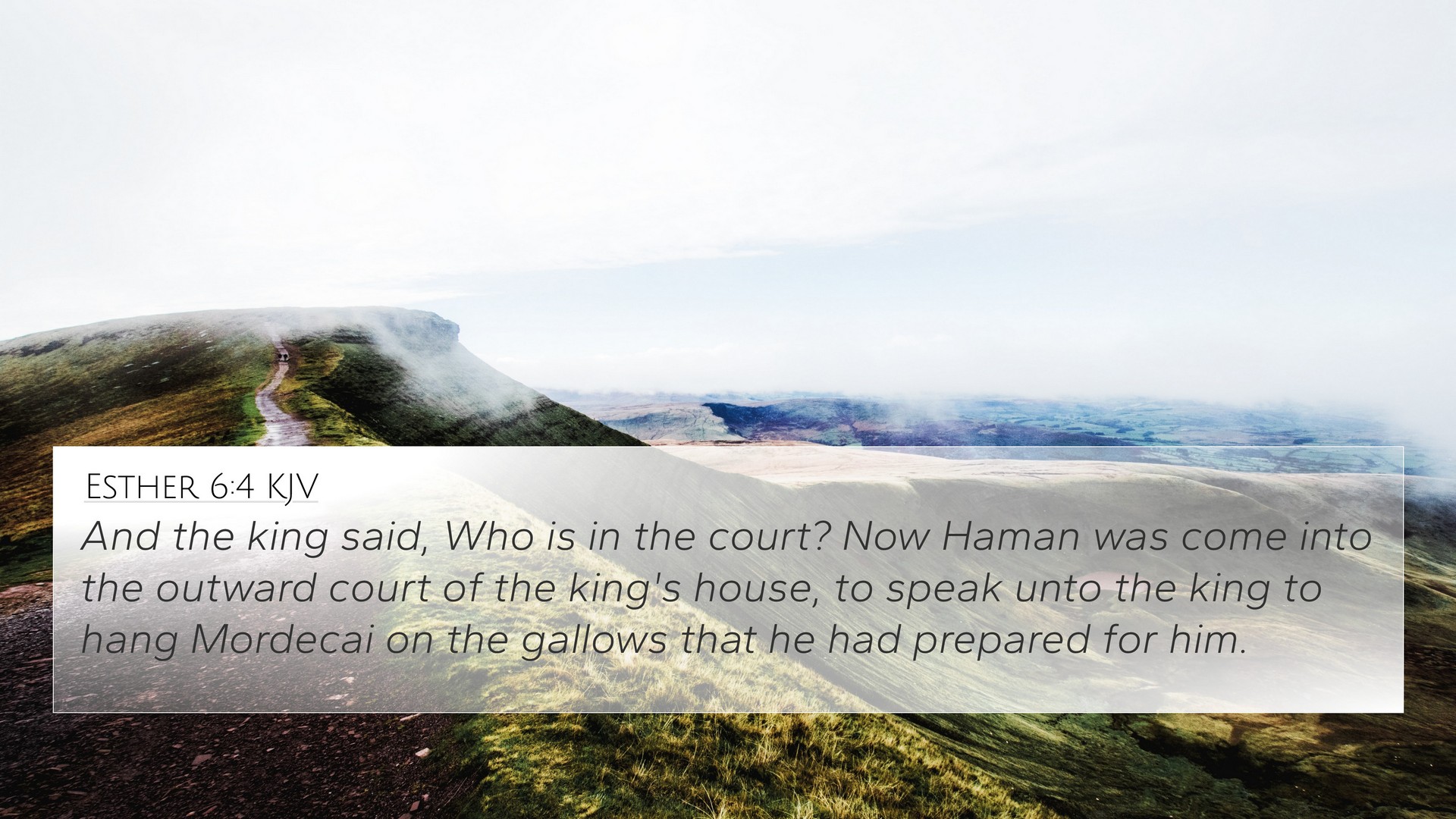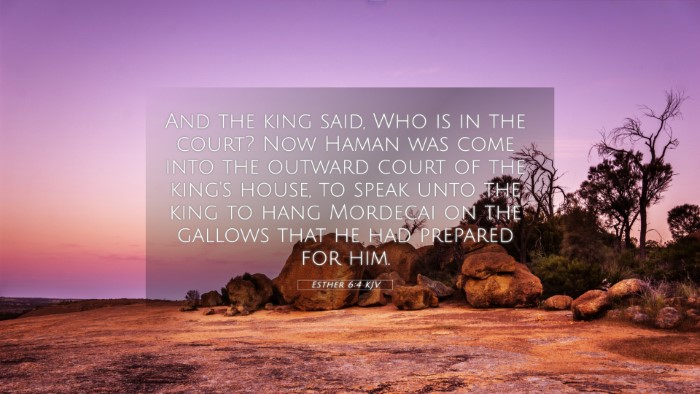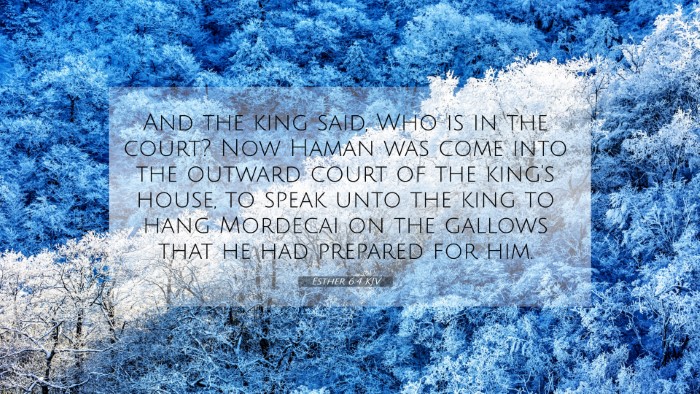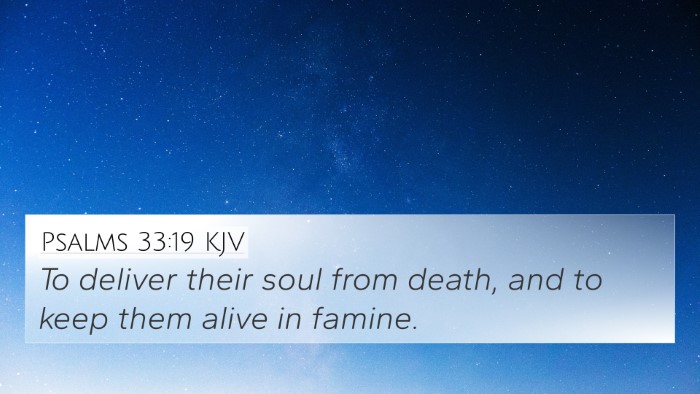Old Testament
Genesis Exodus Leviticus Numbers Deuteronomy Joshua Judges Ruth 1 Samuel 2 Samuel 1 Kings 2 Kings 1 Chronicles 2 Chronicles Ezra Nehemiah Esther Job Psalms Proverbs Ecclesiastes Song of Solomon Isaiah Jeremiah Lamentations Ezekiel Daniel Hosea Joel Amos Obadiah Jonah Micah Nahum Habakkuk Zephaniah Haggai Zechariah MalachiEsther 6:4 Similar Verses
Esther 6:4 Cross References
And the king said, Who is in the court? Now Haman was come into the outward court of the king's house, to speak unto the king to hang Mordecai on the gallows that he had prepared for him.
Uncover the Rich Themes and Topics of This Bible Verse
Listed below are the Bible themes associated with Esther 6:4. We invite you to explore each theme to gain deeper insights into the Scriptures.
Esther 6:4 Cross Reference Verses
This section features a detailed cross-reference designed to enrich your understanding of the Scriptures. Below, you will find carefully selected verses that echo the themes and teachings related to Esther 6:4 KJV. Click on any image to explore detailed analyses of related Bible verses and uncover deeper theological insights.
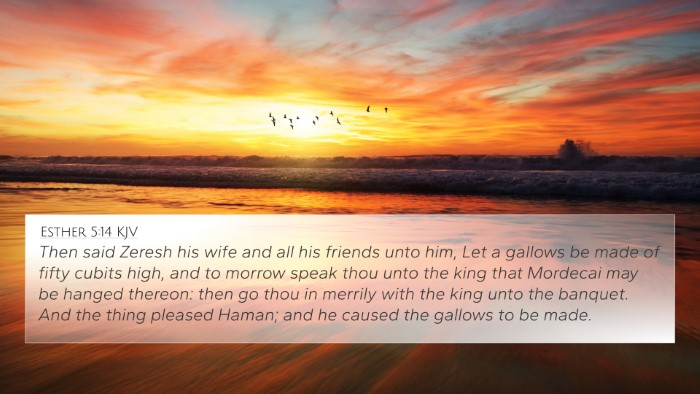
Esther 5:14 (KJV) »
Then said Zeresh his wife and all his friends unto him, Let a gallows be made of fifty cubits high, and to morrow speak thou unto the king that Mordecai may be hanged thereon: then go thou in merrily with the king unto the banquet. And the thing pleased Haman; and he caused the gallows to be made.
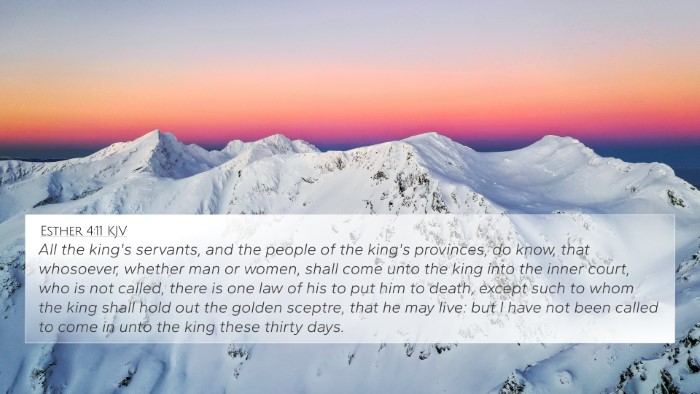
Esther 4:11 (KJV) »
All the king's servants, and the people of the king's provinces, do know, that whosoever, whether man or women, shall come unto the king into the inner court, who is not called, there is one law of his to put him to death, except such to whom the king shall hold out the golden sceptre, that he may live: but I have not been called to come in unto the king these thirty days.
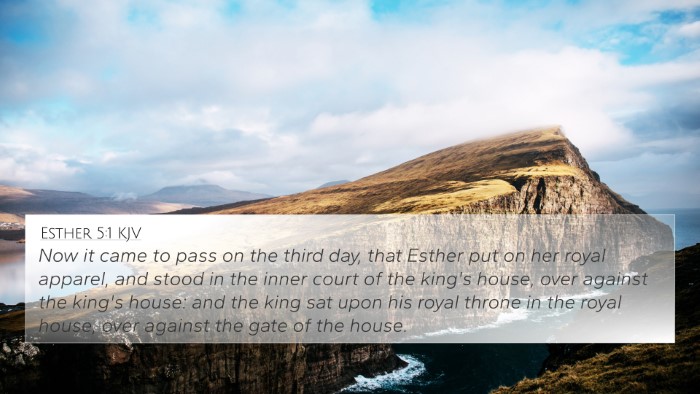
Esther 5:1 (KJV) »
Now it came to pass on the third day, that Esther put on her royal apparel, and stood in the inner court of the king's house, over against the king's house: and the king sat upon his royal throne in the royal house, over against the gate of the house.
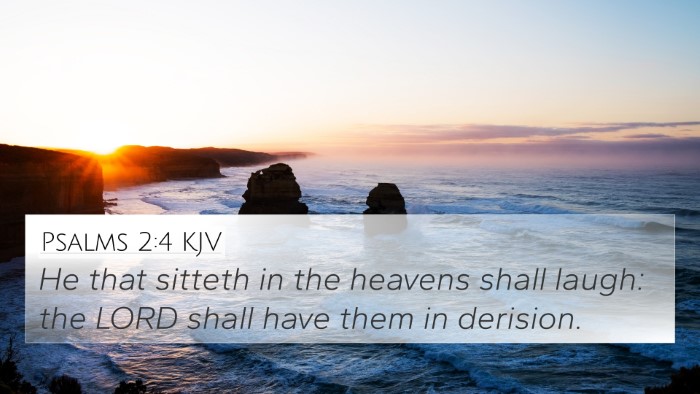
Psalms 2:4 (KJV) »
He that sitteth in the heavens shall laugh: the LORD shall have them in derision.
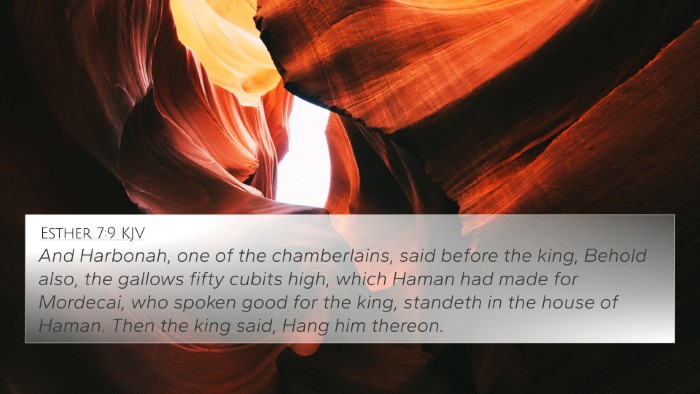
Esther 7:9 (KJV) »
And Harbonah, one of the chamberlains, said before the king, Behold also, the gallows fifty cubits high, which Haman had made for Mordecai, who spoken good for the king, standeth in the house of Haman. Then the king said, Hang him thereon.
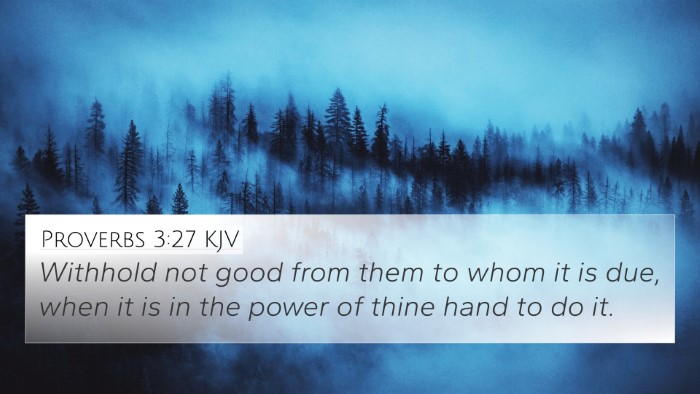
Proverbs 3:27 (KJV) »
Withhold not good from them to whom it is due, when it is in the power of thine hand to do it.

Job 5:13 (KJV) »
He taketh the wise in their own craftiness: and the counsel of the froward is carried headlong.
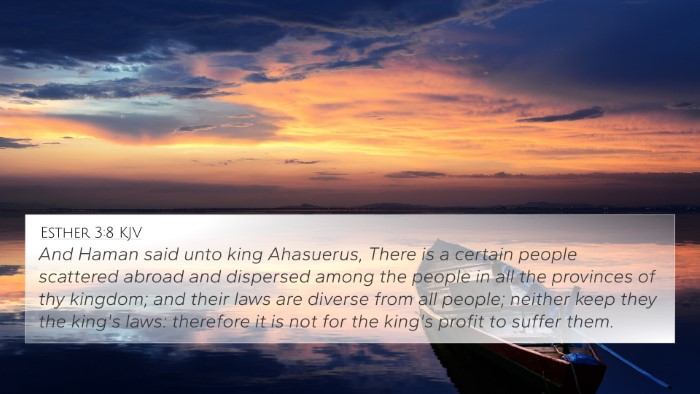
Esther 3:8 (KJV) »
And Haman said unto king Ahasuerus, There is a certain people scattered abroad and dispersed among the people in all the provinces of thy kingdom; and their laws are diverse from all people; neither keep they the king's laws: therefore it is not for the king's profit to suffer them.
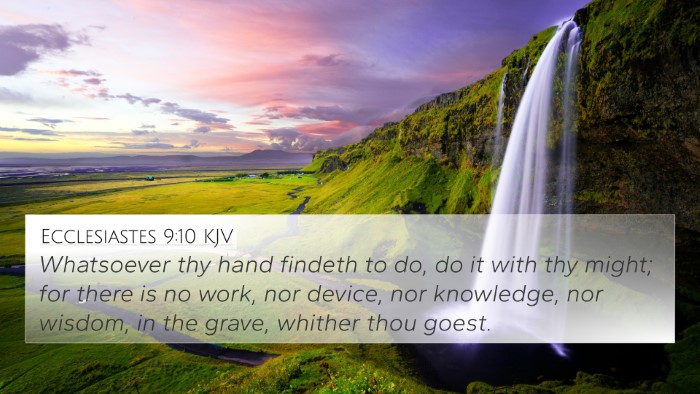
Ecclesiastes 9:10 (KJV) »
Whatsoever thy hand findeth to do, do it with thy might; for there is no work, nor device, nor knowledge, nor wisdom, in the grave, whither thou goest.
Esther 6:4 Verse Analysis and Similar Verses
Meaning and Interpretation of Esther 6:4
Esther 6:4 states: "And the king said, Who is in the court? Now Haman was come into the outward court of the king’s house, to speak unto the king to hang Mordecai on the gallows that he had prepared for him." This verse plays a pivotal role in the narrative of the Book of Esther, serving as a turning point in the events that affect both Haman and Mordecai. Below is a detailed exploration of its meaning, drawing from various public domain commentaries.
Contextual Overview
In order to understand Esther 6:4, it is essential to consider the broader context of the narrative. Haman's plot to annihilate the Jews provides a backdrop of tension and impending doom. Mordecai's earlier refusal to bow to Haman sets the stage for the conflict that unfolds.
Commentary Insights
- Matthew Henry: Henry remarks that the providence of God is evident in this chapter. The king's sleepless night and Haman's arrival showcase divine orchestration. This verse highlights Haman's intent to destroy Mordecai while simultaneously illustrating how the king’s curiosity about who is in the court serves a greater purpose.
- Albert Barnes: Barnes notes the irony in Haman’s timing, as he is approaching the king to seek Mordecai's execution precisely as the king desires to honor Mordecai. This demonstrates a principle of divine justice, where the intentions of the wicked are turned against them.
- Adam Clarke: Clarke emphasizes the absurdity of Haman’s position. His pride leads him to seek the king's approval for Mordecai’s execution, not realizing that the king is about to recognize Mordecai’s loyalty and deeds. This situational irony emphasizes the theme of divine oversight.
Thematic Connections
Esther 6:4 is not just significant for its immediate implications; it also establishes thematic connections with other scriptures. Mentioned here are several key parallels:
- Proverbs 16:18: “Pride goes before destruction, and a haughty spirit before a fall.” This verse draws a direct line to Haman’s downfall, as his pride leads him to seek the king's favor in a deeply ironic situation.
- Galatians 6:7: “Do not be deceived: God is not mocked, for whatever one sows, that will he also reap.” Haman's intention to harm Mordecai is foreshadowed by the justice he ultimately faces.
- Psalm 37:10: “Yet a little while, and the wicked will be no more; though you look carefully at his place, he will not be there.” This encapsulates the transient nature of Haman's power, even as he plots evil.
- Isaiah 54:17: “No weapon that is fashioned against you shall succeed.” This speaks to God’s protection over His people, exemplified in Mordecai’s eventual honor.
- Romans 12:19: “Beloved, never avenge yourselves, but leave it to the wrath of God.” Mordecai’s patience contrasts with Haman’s vengefulness.
- James 4:10: “Humble yourselves before the Lord, and he will exalt you.” Mordecai's humility leads to his ultimate exaltation, contrasting sharply with Haman's arrogance.
- Acts 12:23: “Immediately an angel of the Lord struck him down, because he did not give glory to God.” This shows a pattern of divine retribution against prideful leaders, akin to Haman’s fate.
Inter-Biblical Dialogue
The situation described in Esther 6:4 initiates an inter-Biblical dialogue regarding pride, humility, and divine justice. It allows readers to ponder how God works behind the scenes to thwart the designs of the wicked:
- This verse anticipates future events in scripture where the proud are brought low and the humble exalted, particularly seen in the Gospels (e.g., Luke 1:52).
- It connects with Jesus's teachings on humility and servanthood (Matthew 20:26-28), emphasizing a reversal of worldly standards.
Practical Applications
The lessons from Esther 6:4 transcend their historical context. Here are some applicable insights:
- Understanding Providence: Recognizing God's hand in our daily events encourages believers to trust even when circumstances seem dire.
- Humility over Pride: Haman's fate serves as a warning against pride. Believers are called to live humbly and serve others, trusting in God’s promotion.
- Justice will Prevail: The assurance that God sees and recht the wrongs done against His people can comfort and motivate faithfulness in difficult times.
Conclusion
Esther 6:4 illustrates the profound interactions of divine sovereignty and human action. Through its examination, it becomes clear that God's purpose prevails regardless of human intent. The themes of pride, justice, and divine providence echo throughout scripture, evident in cross-referencing biblical texts and thematic studies. The narrative encourages believers to reflect on the power of humility and the unwavering justice of God in their lives.
